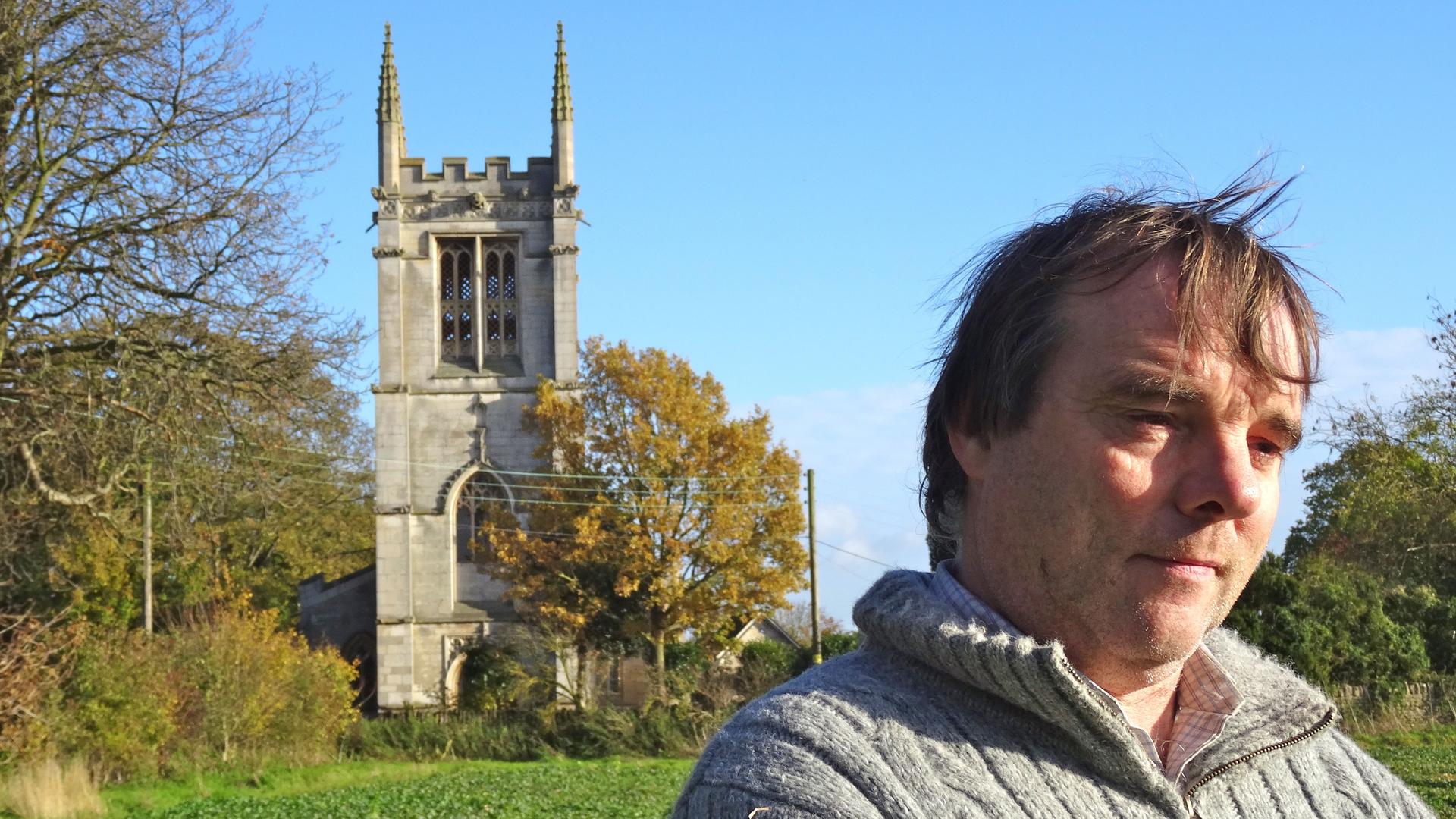English might not have become quite so popular, if a 17th-century poet had his way
Tim Hankins helps maintain All Saints Church in Aldwincle, England. Poet John Dryden was born in Aldwincle and baptized in the church.
In the tiny village of Aldwincle in the flat center of England, farmer Tim Hankins helps look after the village’s most famous building.
Today, he’s showing me around All Saints Church. Strictly speaking, it’s no longer a place of worship; it’s overseen by an organization known as the Redundant Churches Commission.
It’s a shell inside, almost empty. But on the wall, there’s a plaque that explains the significance of All Saints: this was the place where John Dryden, former poet laureate of England, was baptized.
Dryden was born 1631, 15 years after Shakespeare died. Tough act to follow.
Dryden’s poems and plays were nothing like Shakespeare’s. Where Shakespeare was evocative and inventive, Dryden was precise and refined.
 John Dryden was a man of many opinions. Foremost among them was that English — like a naughty schoolboy — was behaving badly. He thought that Shakespeare and his contemporaries were not — as we think now — the leading lights in a golden age of English literature, but a bunch of punks who revelled in showy, linguistic chaos.
John Dryden was a man of many opinions. Foremost among them was that English — like a naughty schoolboy — was behaving badly. He thought that Shakespeare and his contemporaries were not — as we think now — the leading lights in a golden age of English literature, but a bunch of punks who revelled in showy, linguistic chaos.
English was crying out for rules, Dryden thought. And if English didn’t possess those rules, it should import them. From Latin.
“He held Latin to be the superior language, the language par excellence,” says David Crystal, who has co-authored a book about places of significance to the evolution of English.
“The best thing English could do," he said, "is to follow the elegance, the clarity, the diction, the style of the great Latin authors.”
Here’s one Latin-inspired idea: You should never end a sentence with a preposition. “It’s Dryden who thinks up this rule,” says Crystal.
It is a rule that, even today, some people insist on. Dryden thought that most of his rules, though, wouldn’t stick unless they could be enforced.
The best thing to do, thought Dryden, was to follow the example of the French and institute a language academy.
The Académie française had just come into being, on order from King Louis XIII, to “give exact rules to our language.”
A committee chaired by Dryden got together and started to plan for an English academy that would try to control the language, in the way that the French had tried to control theirs.
David Crystal, for one, thinks it’s just as well that Dryden failed. For one thing, he says, academies tend to create a kind of linguistic snobbery.
“If you have an academy, you have a centralizing force and a single variety of the language is held up as being the one that everybody should use,” says Crystal. “This means that if you speak or write the language differently, according to that view, there’s something a bit inferior about that — and you certainly don’t like it if some other part of the world takes your language and tries to change it some way.”
Of course, you don’t need a language academy for that — people all by themselves will decide that they speak the Queen’s whatever, and others don’t. But an academy can intensify snobbish attitudes. It can also alienate those don't speak the "right" way, making the language potentially less popular over time.
Academies can do good, too, says Crystal. Some produce dictionaries and fund research. But for those academies, whose main goal is to control language, well, Crystal thinks they’re doomed to failure. He says Dryden’s conception of an English academy was misguided then, and were it to exist today, it would be ignored.
“In Britain, for the most part, people say if the Americans want to talk like that, let them talk like that — anyway what could we do about it?” says Crystal. “When you think of English as a global language spoken in every country in the world either as a first or second language, or a privileged foreign language, what chance would there be of the entire population of the United States respecting the views of that academy? Or the other two billion people in the world who speak English as a global language?”
That linguistic cat is indeed out of the bag. And frankly, it was never really in the bag. English has been unruly and full of dialects from its beginnings.
So why did John Dryden’s English language academy never come into being?
As it turned out, his timing was terrible. Just when he was trying to hold meetings and drum up support for his idea, the Great Plague struck London, followed a year later by the Great Fire. There was a mass exodus from the capital. And that was that.
Today, Dryden is remembered mainly for his creative writing. And the church that baptized him has been transformed into a sort of village cultural center.
“It’s open to the public to use,” says Tim Hankins. “We’ve had people come and do art exhibitions in here. And we’d had plays down here.”
Hankins tells me of another activity at the church: champing.
I ask him what that is; I’ve never heard of champing.
Hankins says that is staying overnight in the church. A combination of church and camping.
“It’s a new thing,” he says. “I hadn’t heard of it until yesterday.”
A new thing, and a new word. John Dryden might not have approved. But people use the word, and that’s enough to call it English.
For mobile users, click here for a better view of the interactive map below.
